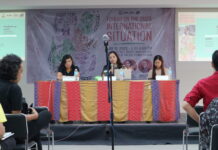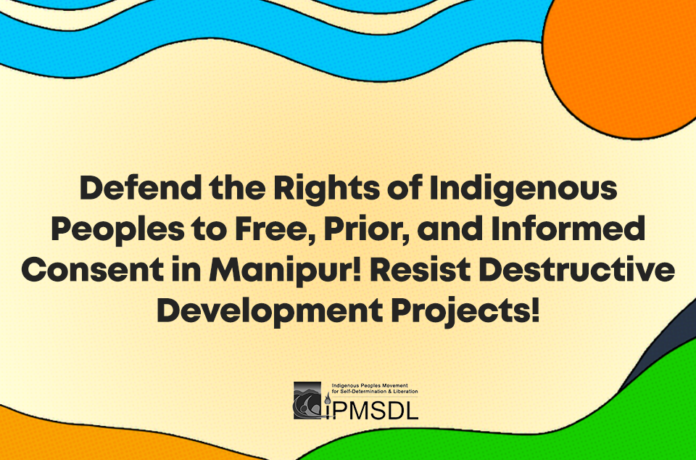Regardless of the Covid-19 pandemic, forced evictions caused by the pending construction of the Imphal Town Ring Road Project which is funded by the Asian Development Bank (ADB), threaten vulnerable Indigenous communities and villages in the Imphal city of Manipur.
The ADB-funded Imphal Town Ring Road Project is one of the cases of aggressive large infrastructure and energy projects in Manipur that do not fully address the problems they claim to solve but will have severe impacts on the rights of Indigenous Peoples and the environment. Another case is the 66 MW Loktak Downstream Hydroelectric Project that is planned to be financed by Japan International Cooperation Agency (JICA).
‘Forced Eviction’
On July 16, 2021, the Deputy Commissioner of Imphal West issued a notice of direct purchase of land in the Imphal West District and an eviction order for the Tharon Village, which labeled the villagers as illegal occupants on the Langol Reserve Forest Areas.
The eviction order does not consider the Indigenous rights to land and territories of the Tharon villagers, belonging to the Kabui tribe, who have been living in the area for over five hundred years. Records have shown that the Tharon villagers have been in the Langol Hills and Forest Areas even before the enactment of forest conservation and reservation policies by the Government of India and the Forest Department in Manipur.
This eviction has caused considerable mental and physical distress to the villagers. Without proper consultation of the affected communities or their free, prior, and informed consent (FPIC) on the construction of Imphal Town Ring Road, the eviction notice violates the rights of Indigenous People to FPIC; the eviction order excludes them from being able to participate in the decision-making process on development projects that will directly affect them and their communities.
This is not the first time that forceful evictions occurred in the region during a global health crisis. In November last year, at least 66 Kuki households were displaced by the construction of the Moreh-Integrated Checkpoint Bypass Road, which is part of the ADB-financed Imphal to Moreh Road Project. The affected villagers were not consulted before their eviction and did not receive proper compensation and rehabilitation.
Impacts on Indigenous Communities
Forceful evictions, at a time of COVID-19, pose serious risks to the lives and livelihood of affected Indigenous villagers. The risk of contracting COVID-19 makes it more difficult for already vulnerable Indigenous Peoples who are unable to receive adequate social services and proper medical care.
According to reports, the construction of the Imphal Town Ring Road Project will destroy the Ipum Pat wetland used by Meitei and Meitei Pangal communities and residents of Khruai Konsam Leika in Imphal East District as a source for water, food, livelihood, and other necessities.
Displacement of Indigenous communities, to make way for profit-led development projects, proves how international financial institutions, such as the ADB, working with local and national governments, undermine the rights of Indigenous peoples and neglect the possible environmental impacts of such projects on affected communities.
Indigenous Peoples’ Response and Ongoing Campaigns
Campaigns to stop the forceful evictions and objections against the Imphal Town Ring Road project have been set in motion since December of 2020. Locals have demonstrated and staged protests by blocking roads to express their concerns.
Tharon villagers organised demonstrations calling for a stop to the forceful displacement on June 17, 2021, and expressed their strong resistance against the Imphal Town Ring Road through a sit-in protest at their community hall on June 26, 2021.
These ongoing campaigns to resist profit-led development and assert Indigenous Peoples’ rights open doors for many Indigenous communities that are facing similar cases of rights violations caused by governments working for and with big foreign businesses to struggle for their right to self-determination. On paper, IFIs, such as the ADB, claim to respect the rights of Indigenous Peoples but their process of gathering or manufacturing consent and the impacts of such development projects on Indigenous Peoples and the environment must be exposed and confronted.
We at the International Indigenous Peoples Movement for Self-Determination and Liberation firmly stand in solidarity with our members and the affected Indigenous communities in Manipur who are resolutely voicing their concerns and claiming their rights to self-determination and development. We strongly urge our members and networks working in the international community to show their support for Indigenous Peoples by joining these campaigns. Governments and financial institutions must respect and uphold the rights of Indigenous Peoples in any and every development project potentially affecting Indigenous communities and the environment.


















